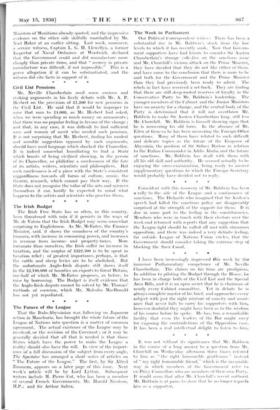The Week in Parliament Our Political Correspondent writes : There
has been a substantial rise in Mr. Baldwin's stock from the low levels to which it has recently sunk. Now that Govern- ment supporters have had leisure to consider Sir Austen Chamberlain's strange yolk:fare on the sanctions issue and Mr. Churchill's vicious attack on the Prime Minister, they have decided that they do not like either of them, and have come to the conclusion that there is more to be said both for the Government and the Prime Minister than they had previously been ready to admit. The rebels in fact have received a set-back. They are finding that there are still deep-rooted reserves of loyalty in the Conservative Party to Mr. Baldwin's leadership. The younger members of the Cabinet and the Junior Ministers have no anxiety for a change, and the central body of the Party is determined that it will not overthrow Mr. Baldwin to make Sir Austen Chamberlain king, still less Mr. Churchill. Mr. Baldwin is himself showing signs that he is recovering his old form. In the absence of Mr. Eden at Geneva he has been answering the Foreign Office questions. Many of them have related to such difficult and delicate topics as the future of the Emperor of Abyssinia, the position of Sir Sidney Barton in relation to the Italian Commander in Addis Ababa and the future of sanctions. Mr. Baldwin has dealt with them with all his old skill and authority. lie seemed actually to be enjoying the cross-examination, being ready to answer supplementary questions to which the Foreign Secretary would probably have decided not to reply.






















































 Previous page
Previous page